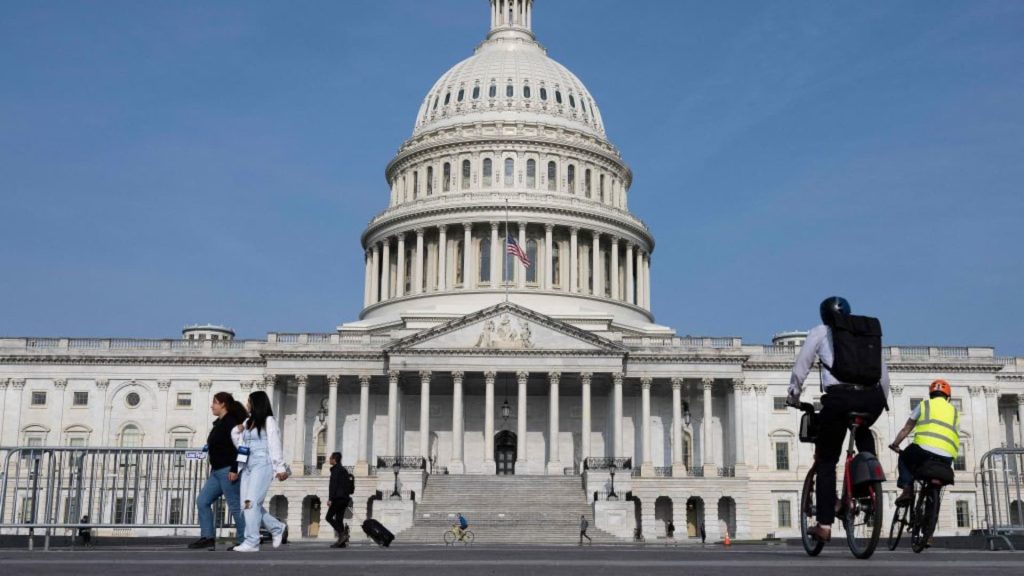WASHINGTON — The Congressional Budget Office on Friday said that tax revenues and emergency measures after June 15 “will probably allow the government to continue financing operations through at least the end of July.”
The updated guidance otherwise reiterated the CBO’s earlier uncertainty about the debt ceiling during the first few weeks of June. Even though mid-June tax revenues could ease pressure on the Treasury through July, there’s still the risk of default in the first few weeks of June, the key government forecaster said.
related investing news
“If the debt limit remains unchanged, there is significant risk that at some point in the first two weeks of June, the government will no longer be able to pay all of its obligations,” said the CBO report.
The new report came as the White House and congressional leaders postponed a scheduled Friday meeting to continue negotiations, citing little progress so far over any deal to cut spending and pair that with a debt limit hike.
Read more: Confused about the debt ceiling? Here’s what you need to know
“The extent to which the Treasury will be able to fund the government’s ongoing operations will remain uncertain throughout May, even if the Treasury ultimately runs out of funds in early June. That uncertainty exists because the timing and amount of revenue collections and outlays over the intervening weeks could differ from CBO’s projections,” said the latest report.
The CBO also issued an updated projection of the federal budget deficit for 2023, raising it to $1.5 trillion.
The office warned that there was still “a great deal of uncertainty” around the deficit figure, in part due to an expected Supreme Court ruling on President Joe Biden’s student loan forgiveness plan.
Legal experts told CNBC the nation’s highest court is likely to strike down the $400 billion debt forgiveness plan, given the court’s conservative majority.
If that happens, the administration would likely record the money it set aside for the loan forgiveness last year as a reduction in outlays this year, the CBO reported.
The CBO is a nonpartisan federal agency that provides objective budget and economic data to Congress, typically to inform legislation.
The debt ceiling talks were postponed less than a day before Biden was set to sit down with House Speaker Kevin McCarthy, R-Calif., Senate Minority Leader Mitch McConnell, R-Ky., Senate Majority Leader Chuck Schumer, D-N.Y., and House Minority Leader Hakeem Jeffries, D-N.Y.
That meeting was to be the second this week, after a Tuesday huddle failed to produce any significant developments.
It was unclear Friday what impact, if any, the new report would have on talks currently underway at the staff level, between aides to the four congressional leaders and White House liaisons.
As both the House and Senate prepared to leave for the weekend on Thursday, McCarthy said he had not seen “a seriousness” from the White House regarding any potential deal. “It seems like they want to default more than they want a deal,” the California Republican told reporters in the Capitol.
Democrats appeared equally dug in, as Senate Majority Leader Chuck Schumer indicated in a letter to his caucus Friday, in which he said staff level talks would continue in the coming days.
Yet even as aides worked to find common ground, Schumer said Democratic senators would keep “highlighting the devastating impact” of cuts to the federal budget that are part of a bill passed by House Republicans last month.
Central to the partisan impasse is the White House’s insistence that Congress vote to raise the debt limit without preconditions, and House Republicans’ demand that any debt limit hike be paired with sweeping cuts to federal spending and new work requirements for social safety net programs.
Failure to raise the debt ceiling before the U.S. runs out of available cash and emergency measures would cause an “economic catastrophe,” Treasury Secretary Janet Yellen said Monday.
“That is something that could produce financial chaos, it would drastically reduce the amount of spending and would mean that Social Security recipients and veterans and people counting on money from the government that they’re owed, contractors, we just would not have enough money to pay the bills,” Yellen told CNBC’s “Closing Bell: Overtime.”
Read the full article here




